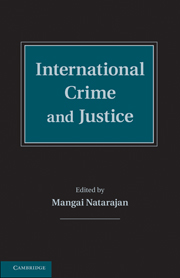Book contents
- Frontmatter
- Contents
- List of Figures
- List of Tables
- List of Contributors
- Foreword
- Preface
- Introduction
- Part I International Criminology
- Part II Law, Punishment, and Crime Control Philosophies of the World
- Part III Transnational Crime
- Part IV Organized Crime and Terrorism
- 30 Transnational Organized Crime
- 31 The Rise of Balkan Organized Crime
- 32 Russian Organized Crime
- 33 The Italian Mafia
- 34 Extortion and Organized Crime
- 35 Organized Crime in Asia
- 36 Drug Cartels
- 37 The International Implications of Domestic Terrorism in the United States
- 38 Terrorism
- Part V International crime
- Part VI Delivering International Justice
- Part VII International Cooperation and Criminal Justice
- Part VIII International Research and Crime Statistics
- Part IX International research resources
- World Map
- Index
- References
31 - The Rise of Balkan Organized Crime
Published online by Cambridge University Press: 05 October 2014
- Frontmatter
- Contents
- List of Figures
- List of Tables
- List of Contributors
- Foreword
- Preface
- Introduction
- Part I International Criminology
- Part II Law, Punishment, and Crime Control Philosophies of the World
- Part III Transnational Crime
- Part IV Organized Crime and Terrorism
- 30 Transnational Organized Crime
- 31 The Rise of Balkan Organized Crime
- 32 Russian Organized Crime
- 33 The Italian Mafia
- 34 Extortion and Organized Crime
- 35 Organized Crime in Asia
- 36 Drug Cartels
- 37 The International Implications of Domestic Terrorism in the United States
- 38 Terrorism
- Part V International crime
- Part VI Delivering International Justice
- Part VII International Cooperation and Criminal Justice
- Part VIII International Research and Crime Statistics
- Part IX International research resources
- World Map
- Index
- References
Summary
After the end of the Cold War, organized crime became a subject of grave concern for the European Union (EU). No longer was it perceived as an American or Italian phenomenon only. In 2000, Javier Solana, the Secretary General of the Council of the EU stated: “It is an enemy we must defeat, or it will defeat us.” In particular, organized crime groups from Southeast Europe (SEE) – frequently referred to as Balkan organized crime groups – attracted enormous international attention during the 1990s. One reason for their dramatic rise was the way the postcommunist transition was initiated in SEE, compared to Central Europe or the Baltic states. In SEE, the reform process was neither smooth nor peaceful; it was marked by the violent dissolution of Yugoslavia.
Moreover, the emerging accommodations between corrupt SEE authorities and organized crime groups during the creation of new states fostered the development of crime-permeated societies. Balkan organized crime groups often enjoyed political support and profited from the 90s’ lawlessness. They were labeled “highly dangerous,” posing a serious threat to Western societies (European Council, 2003; UNODC, 2008). For the purpose of this chapter, the term “Balkan organized crime” refers to organized crime groups whose members originate mainly from Albania, Kosovo, Bosnia and Herzegovina, Bulgaria, Croatia Macedonia, Montenegro, Romania, and Serbia. This chapter discusses the nature, structure(s), and activities of these groups.
- Type
- Chapter
- Information
- International Crime and Justice , pp. 239 - 246Publisher: Cambridge University PressPrint publication year: 2010



